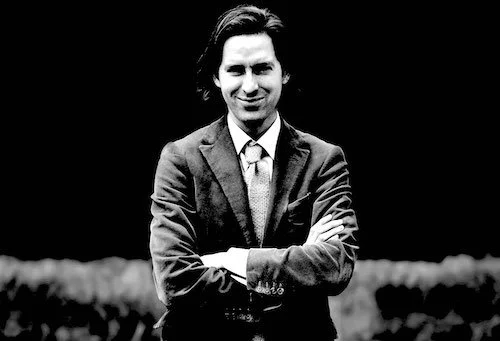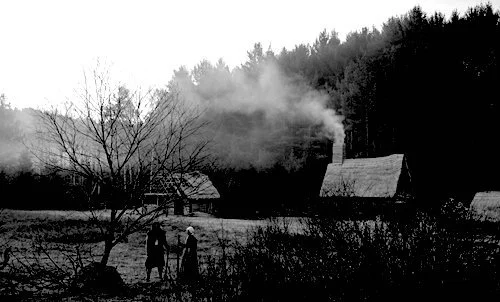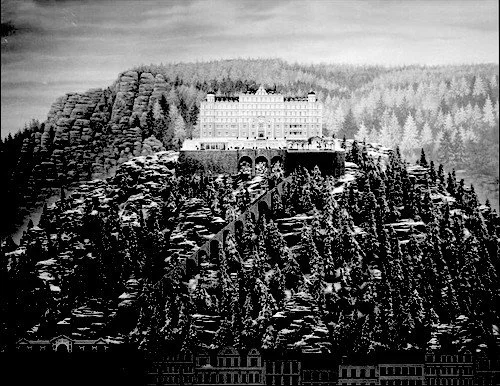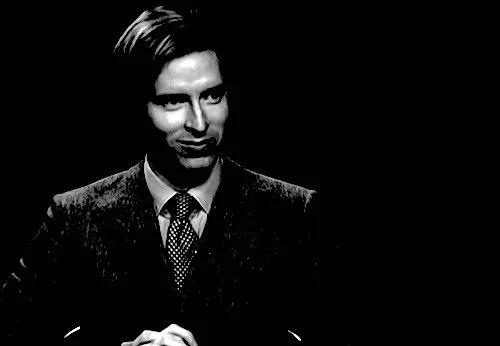What If: Wes Anderson Directed a Horror movie?
Written by Cameron Geiser
The French Dispatch may have been my favorite movie of 2021, but the film was definitely well within Wes Anderson’s comfort zone cinematically speaking. While the director’s work has always varied from film to film in the details, atmosphere, and color palettes- it's all felt a bit similar underneath those varying coats of paint. Therefore a question struck me, what if Wes Anderson made a bold new genre choice for his next film, what if he made a horror film? What would that look like? Who would be cast in it? How would the kitschy twee director tackle the genre, and would it actually be scary? Well, I think I’ve got a movie pitch that answers those very questions.
So, what makes Wes Anderson’s films so easily identifiable as his? There’s a few key aspects that we’ll carry over from his body of work into this new film. Obviously the director isn’t going to ditch all of his most pervasive creative choices, but I’m willing to bet on his ability to surprise us all. Even if it’s a horror flick that looks like it’s a Wes Anderson movie- but doesn’t feel that way. Firstly, the time and place of the setting is vitally important. Anderson almost always sets his films in the past, frequently mid to early twentieth century. This one is no different. We begin the film in France, in the early 1960’s. A European setting is also a frequent, but not always necessary, component. He also has a troupe of actors that frequently work with him on multiple projects. This too will apply here as well. I’ve included a set of some of his most well known collaborators, some with bigger roles than before, with a handful of new actors brought into the fold- as is tradition. Then there’s the most repeated commonalities between all of his work. Anderson frequently employs symmetrical framing in his shots, lateral tracking shots, soft lighting, consistent color palettes, flawed characters, a healthy mix of both the working and wealthy classes, and a very literary use of language. We can assume that all of these things would make their way into the film in some manner.
The opening scene would function similarly to The Witch in how it sets the tone for the rest of the film. The story begins with Keanu Reeves as Jules, a doting widowed father that lives in a small rural village near Paris just before tragedy strikes. In the dead of night Jules awakens in a cold sweat as he hears the screams of his son. He races out of the house lit only by the moon, evidence of a hurried scramble all about the small abode, and into the street as he spies the villain. A shambling husk of spindly arms under a ragged cloak is drawing an image onto the ground. Jules lurches forward seeing the creature grasping his son and locks eyes with the foul evil, it’s maw curling into a menacing grimace as the two disappear in a bright flash of light. Distraught and in search of aid, Jules embarks on a quest to save his son. He goes to every Police Station seeking anyone that will listen to him and not laugh at his strange tale. Most assumed Jules was just a drunk, some questioned if he even had a son to begin with. Eventually he ends up in Paris at a small, and hitherto widely unknown, detective agency owned and operated by an American Expat from the second World War, Roger (George Clooney) and two of his closest wartime associates in Maurice (Jeffrey Wright), also an American, and Pierre (Jason Schwartzman), a quiet but studious Parisian.
Maurice is the first person to take Jules' story seriously, even Roger and Pierre are wary of Jules' tale of woe initially. Maurice finally convinces them to take on the case by pointing out that even if the story has elements of elaboration, at the end of the day, this is still a missing persons case. Once the trio decide to take up the case the film follows the story from their point of view for a while. After examining the scene of the crime the three intrepid detectives question the townsfolk and then broaden their search to Paris as a whole. Hints of clues and red herrings aplenty nearly push them to shut the case for good until they encounter an eccentric Cafe owner named Béatrice (Tilda Swinton). Pierre bemoans the broad details of his case to Béatrice over a cup of coffee when she realizes that she may know someone who knows a thing or two about supernatural evil. She mentions a regular patron of her cafe, Bernard (Jeff Goldblum) the bookstore owner who specializes in the histories of Monsters and Mythology. If you’re going to have a character dole out exposition about the antagonist, why not cast Jeff Goldblum? This sets them on the path to Bernard, who in turn points them to one of the only known individuals to have escaped the grasp of a potentially monstrous kidnapper, the now adult Armand (Daniel Kaluuya). Armand is British, from London specifically, and under normal circumstances he wouldn’t have admitted the details of his past to the detectives and Jules (who returned to the film to meet Armand per his request of the detectives to include him as much as possible).
However, when they meet Armand, he’s on the road at an Inn outside of Paris with a traveling partner, a middle aged man of South Korean descent who goes by the nickname “Dark Heart” (Song Kang Ho). Armand explains that while he doesn’t know the true nature of the monstrous figure that had kidnapped him as a child in the night, he knows where it resides. Which is why he was taking Dark Heart to confront the mysterious kidnapper, he too had sought out Armand for the whereabouts of the foul beast. He and Armand had come to understand each other, despite a bit of a language barrier. Armand knew many languages and could make a bit of conversation with him. They had chosen the nickname “Dark Heart” as that was how he could best describe who he was after a similar kidnapping had taken his son from him. Initially he had been as hopeful as Jules was- until the authorities found his son’s body, completely sunken and drained of blood. Dark Heart was there for revenge, plain and simple. Thus Jules is literally met with both hope and despair in Armand and Dark Heart’s stories.
At this point in the story the detectives and Jules part ways. There’s a disagreement between them as Roger believes they need more evidence and he’s distinctly against killing any suspects. Maurice and Pierre understand the compelling emotional undertones for Dark Heart, Jules, and Armand, but they agree with Roger and the three head towards the small town that Armand had noted as their destination. I wanted to split the two groups of three up on their way to the town where the third act would take place to allow the detectives to meet an important character without Jules, Armand, and Dark Heart. The two groups can be understood as wanting similar outcomes through different means. The detectives want a case closed, by the book, justice served through deliberate means within the system. The assorted travellers want personal revenge by any means necessary. At least Armand and Dark Heart do, but Jules just wants his son back, he hasn’t given up hope. Analytical and calculating versus raw and emotional. The detectives question the few people willing to talk to them in the small mountain town and end up at the only Inn the town has. While there, Maurice puts together a couple of clues and spots a lone figure in the lounge of the Inn. He makes the connection between those clues, that this older woman may be in league with the mysterious villain supposedly residing in the castle just outside of town.
The trio of sleuths eventually have a discussion with her in which she reveals that she, Adina (Anjelica Huston), does work for the evil residing in the castle nearby, but that she is in forced servitude because of a mistake made by one of her ancestors ages ago. She reveals her family’s backstory in which her ancestor had mistakenly interrupted the Lord of the castle (Willem Dafoe) who was performing an incantation. Whether or not the story wants to go into elaborate detail or not would be up to Anderson, but this is the background of the villain. He was performing an incantation to become a Lich. Unfortunately, due to the interruption, the spell was incomplete and in a sense, corrupted. This meant that instead of only requiring the blood of an innocent child once for the transformation, he would require new blood every month or two, lest he perish. So, for this interruption, the newly disfigured Lich would put a curse on their family lineage and keep their souls in limbo as each new generation would be made to seek out “ideal children” for him to devour.
After this reveal, the assorted travellers would rejoin the story (they’d gotten lost on the way) and when they see the mysterious woman speaking with the detectives Dark Heart leaps into action, mistaking her as “The Witch” and killing her. Which, ironically releases her soul, and generations of her family’s souls to finally be put to rest. This also forces the Lich into an encounter once the troupe makes their way to the castle entrance. There they are met with the Lich’s Butler, Victor (Bill Murray), who will have a comedic bit where Roger demands Victor take them to “That blood sucking Dracula”, to which Victor dryly replies (almost offended by the notion) “I assure you, he’s not a Dracula”. There is, of course, a final confrontation between the protagonists and the Lich. He’ll give a powerful and truly horrifying monologue, there’s some sort of fight, some characters will die, some will live, and Jules is reunited with his son. There you have it. I think there’s enough structure here to form what could be a Wes Anderson horror movie. It’s certainly one that I’d be happy to put a few dollars down and see at the local theater. Below I have some notes that didn’t quite fit into the story description and a breakdown of the cast. Hopefully you enjoyed this What If?, I certainly had a good time conjuring it up!
Some quick notes:
•Roger is insistent on the pronunciation of his name “It’s Raaa-Jer. Not Rajiere” and he’s visually annoyed by French accents muddling his name, but he just won’t let it go.
•Once all six of the protagonists are together they have a discussion about what to call the kidnapper. Some want to call it a Demon, some suggest simply calling it pure evil, but Dark Heart is adamant that it’s a Witch. This could be a fun bit of wordplay with languages, different mythologies and histories etc.
•Song Kang Ho speaks in Korean throughout the film with his own subtitles. Daniel Kaluuya’s character occasionally acts as interpreter, but Wes Anderson has juggled multiple languages in the past before, besides, there’s some striking storytelling opportunities there.
•Keanu Reeves’ Jules and Song Kang Ho’s Dark Heart become fast friends after learning of each others’ shared tragedy.
•The score of the film should be vastly different from what Anderson has employed in the past. This will have massive implications for the tone and mood of the film.
•Title of the film: An Old Evil -Which is only said once, by Jeff Goldblum’s Bernard at the bookstore. When he passes over a page devoted to Liches, Pierre asks what that is, to which Goldblum coyly responds “That there my friend is an, uh, an Old Evil. Nasty stuff”.
Cast
Keanu Reeves as Jules: a Father wronged by The Lich. He has similar motivation to his John Wick character, but Jules isn’t quite as composed as Wick. Righteous revenge and love of his missing son fuels him. He’s the closest the film is going to get to a lead in this ensemble.
Willem Dafoe as The Old Evil: The former Lord of a small mountainous town that turns himself into a Lich- with one fatal flaw.
Anjelica Huston as Adina: She works for the Lich. Like a Ghislaine Maxwell figure, though only due to generational subjugation by the Lich. She’s crucial to building up the fear of the Lich, how others react to the Lich’s presence greatly impacts audience expectation.
Bill Murray as Victor: The Lich’s Butler, he’s technically aligned with the Lich, but not enthusiastically. Small role, but every Wes Anderson film has an obligatory cameo from Bill Murray.
George Clooney as Roger: The owner and head of the detective agency. The eldest of the three, an American that decided to remain in France after the war. Slightly arrogant, but good-hearted.
Jeffrey Wright as Maurice: The detective that first meets Jules and convinces the others to take on his case. Also an American, Maurice was in Roger’s Platoon under his command in France and decided to take Roger’s offer to work as his right hand man at his detective agency in Paris after the war. He’s the moral soul of the film, pushing others to consider all of the facts on the ground, and the one most likely to make others pause and consider their options.
Jason Schwartzman as Pierre: The other two detectives tease him as being the young boy of the troupe- even though he’s in his early forties. Quiet, but observant.
Tilda Swinton as Béatrice: A quirky cafe owner in Paris that points the detectives to Bernard’s bookstore tucked away down a lonely side street near the Seine.
Jeff Goldblum as Bernard: A Historian that runs a small bookstore called Of Monsters and Mythology that the detectives consult in Paris after Béatrice recommends him for assistance in their search.
Daniel Kaluuya as Armand: Traveling with Dark Heart when the detectives meet him, a citizen of Britain who had escaped The Lich’s grasp as a child. He would not have gone back to the Castle he escaped from as a child of his own accord, but Dark Heart’s story convinced him.
Song Kang Ho as “Dark Heart”: His child was caught and murdered by The Lich. He’s out for revenge and eventually tracks down Armand, the only known survivor of the monstrous kidnapper. (Nickname comes from the characters’ misunderstanding of Korean names and this was an acceptable language band-aid that the characters agreed upon as it is an accurate representation of how this character feels after his child’s murder)
Cameron Geiser is an avid consumer of films and books about filmmakers. He'll watch any film at least once, and can usually be spotted at the annual Traverse City Film Festival in Northern Michigan. He also writes about film over at www.spacecortezwrites.com.






